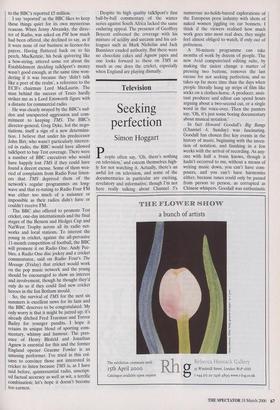Radio
Bowled over
Michael Vestey
MnK MacKenzie's cage was so rattled last week that he fell off his perch, beak- dived into the sand and could only gnaw dementedly at the cuttlefish bone. He'd just heard that talkSport, his independent speech radio station, had failed to secure the rights to broadcast ball-by-ball com- mentary of the English domestic cricket Tests. Although he bid more than the BBC, the England and Wales Cricket Board, the ECB, preferred the BBC's breadth of cov- erage to his own offering.
In fact, I almost fell off my own perch when I heard the announcement on Radio Four's PM programme. I had not expected the BBC to win this battle as MacKenzie, largely backed by Rupert Murdoch's empire, is prepared to pay over the odds for any sport if he can beat the BBC. Until now, the Corporation had shown a some- what . desultory interest in keeping Test Match Special on radio and cricket on tele- vision, losing the latter to Channel 4. MacKenzie had already outbid the Corpo- ration for ball-by-ball commentary of over- seas Tests and I thought he would do it again. Financially, of course, he should have done as he offered £7.5 million to the BBC's reported £5 million.
I say 'reported' as the BBC likes to keep these things quiet for its own mysterious reasons. When Jenny Abransky, the direc- tor of Radio, was asked on PM how much had been offered, she declined to say, as if it were none of our business as licence-fee payers. Having fluttered back on to his perch, MacKenzie, his beak quivering like a bow-string, uttered some rot about the Establishment deciding talkSport's money wasn't good enough, at the same time won- dering if it was because they 'didn't talk like a peer of the realm', a reference to the ECB's chairman Lord MacLaurin. The man behind the success of Tesco hardly strikes me as a Lord Emsworth figure with a distaste for commercial radio.
He was clearly swayed by the BBC's sud- den and unexpected aggression and com- mitment to keeping TMS. The BBC's director-general, Greg Dyke, led the nego- tiations, itself a sign of a new determina- tion. I believe that under his predecessor John Birt, who wasn't particularly interest- ed in radio, the BBC would have allowed talkSport to buy Test coverage. There were a number of BBC executives who would have happily lost TMS if they could have found a decent excuse. Some of them wea- ried of complaints from Radio Four listen- ers that TMS deprived them of the network's regular programmes on long- wave and that re-tuning to Radio Four FM was either too much of a nuisance or impossible as their radios didn't have or couldn't receive FM.
The BBC also offered to promote Test cricket, one-day internationals and the final stages of the Benson and Hedges Cup and NatWest Trophy across all its radio net- works and local stations. To interest the young in cricket, against the all-pervasive 11-month competition of football, the BBC will promote it on Radio One. Andy Pee- bles, a Radio One disc jockey and a cricket commentator, said on Radio Four's The Message (Friday) that cricket would work on the pop music network and the young should be encouraged to show an interest and involvement, though he thought they'd only do so if they could find new cricket heroes in the Ian Botham mould.
So, the survival of TMS for the next six summers is excellent news for its fans and the BBC deserves to be congratulated. My only worry is that it might be jazzed up; it's already ditched Fred Trueman and Trevor Bailey for younger pundits. I hope it retains its unique blend of sporting com- mentary, whimsy and humour. The pres- ence of Henry Blofeld and Jonathan Agnew is essential for this and the former England opener Graeme Fowler is an amusing performer. I've tried in this col- umn to convince those not interested in cricket to listen because TMS is, as I have said before, quintessential radio, unscript- ed factual accuracy as well as wit, a terrific combination; let's hope it doesn't become too earnest. Despite its high quality talkSport's first ball-by-ball commentary of the winter series against South Africa lacked the same enduring appeal. The presence of Geoffrey Boycott enlivened the coverage with his mixture of acidity and sarcasm and his col- leagues such as Mark Nicholas and Jack Bannister exuded authority. But there were no chocolate cakes and Agnew japes and one looks forward to these on TMS as much as one does the cricket, especially when England are playing dismally.



















































































 Previous page
Previous page